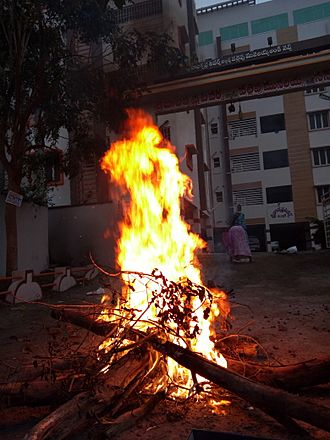Bhogi facts for kids
Quick facts for kids Bhogi |
|
|---|---|

Bhogi fire at Sri Balakrishna Towers, Gorantla, Guntur
|
|
| Official name | Bhogi |
| Also called | Bhōgi, Lōhri |
| Observed by | Hindus in South India, Sri Lanka, Singapore, Malaysia, Indonesia |
| Type | Seasonal, traditional |
| Significance | Midwinter festival |
| Celebrations | Bonfire |
| Observances | Bonfire |
| Date | Last day of Agrahayana month of Hindu calendar |
| Related to | Makar Sankranti Bihu (Bhogali / Magh / Bhogi in Tamil,Telugu) lohri |
Bhogi is a special festival celebrated mainly in South India. It's the first day of the four-day Pongal Festival, which is also known as Makar Sankranti. This festival usually happens on January 13th each year, according to the modern calendar. It's a time for new beginnings and letting go of old things. People in places like Tamil Nadu, Andhra Pradesh, Telangana, Karnataka, and Maharashtra celebrate Bhogi with great joy.
Contents
What is Bhogi?
Bhogi is a festival that marks the end of the old and the start of the new. It's a day to clean up and prepare for fresh beginnings. The word "Bhogi" itself means "enjoyment" or "abundance," which fits the festive mood. It's a time when families come together to celebrate.
When is Bhogi Celebrated?
Bhogi falls on the last day of the Agrahayana or Mārgaśīrṣa month in the Hindu calendar. This usually means it's celebrated on January 13th. It's a midwinter festival, bringing warmth and light during the colder months. The date is fixed each year based on the Hindu calendar.
Where is Bhogi Celebrated?
This festival is very popular in many parts of India. You'll find it celebrated widely in the southern states. These include Tamil Nadu, Andhra Pradesh, Telangana, and Karnataka. It's also observed in Maharashtra. Beyond India, Hindus in countries like Sri Lanka, Singapore, Malaysia, and Indonesia also celebrate Bhogi.
Traditions of Bhogi
On Bhogi, people focus on change and transformation. It's a day to get rid of things that are no longer useful. This tradition helps people make space for new and better things in their lives. It's a symbolic way to start fresh.
The Bonfire Tradition
One of the most important traditions on Bhogi is lighting bonfires. Early in the morning, people gather to light these fires. They use old wooden furniture, logs, and other items from their homes that they don't need anymore. This bonfire symbolizes burning away the old. It represents getting rid of bad habits and negative thoughts. It's a way to welcome new positive energy.
New Beginnings
The Bhogi bonfire also marks the end of the year's accounts. It signals the start of new accounts for the harvest season. This means it's a time to settle old matters and look forward. It's about setting new goals and hopes for the future. The festival encourages a fresh start for everyone.
Significance of Bhogi
Bhogi is a festival of gratitude and renewal. It shares similarities with other harvest festivals. These include Pongal and Lohri. All these festivals celebrate the harvest and new beginnings.
Honoring Lord Indra
Bhogi is also dedicated to Lord Indra. In Hindu mythology, Lord Indra is the god of rain and thunder. He is also known as the "King of Gods." People pray to Lord Indra for good harvests and prosperity. They believe he blesses the land with rain, which is essential for crops. Celebrating Bhogi is a way to thank him for his blessings.

